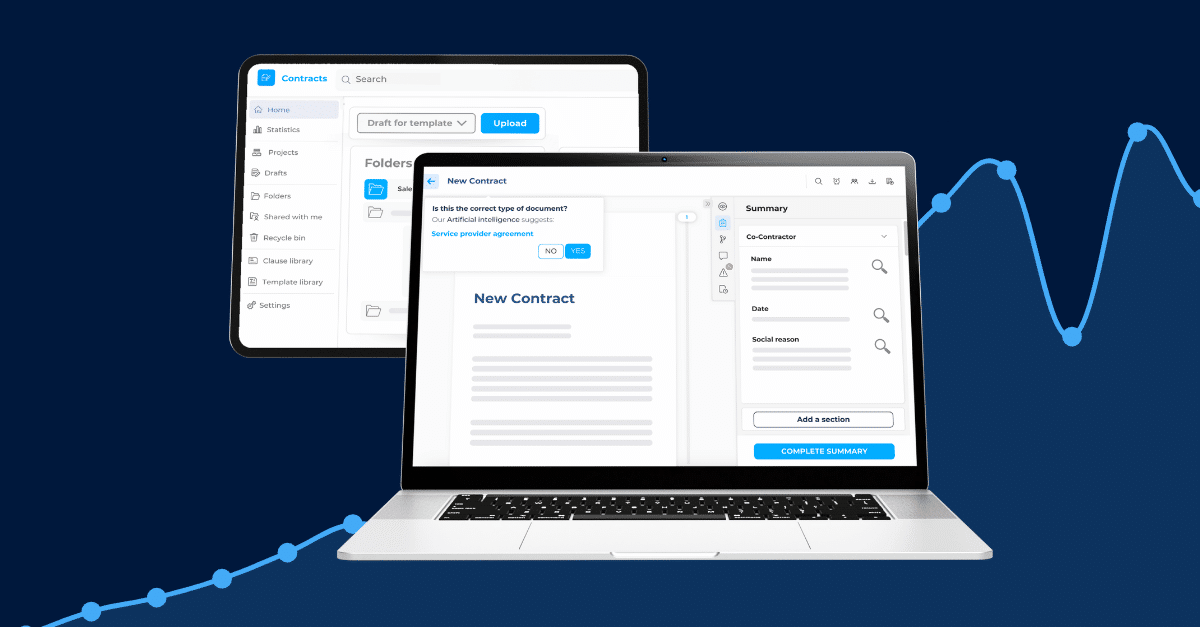Enterprise contract management centralizes and automates the entire contract lifecycle, transforming how organizations create, track, and leverage agreements. By replacing fragmented, manual processes with a unified platform, businesses gain greater visibility, control, and compliance across all contracts. Key benefits include streamlined workflows, enhanced data insights, improved risk management, and seamless integration with existing systems. As AI and advanced analytics shape the future, enterprise contract management empowers companies to reduce risk, boost efficiency, and turn contracts into strategic business assets.
Enterprise contract management represents a critical function for modern businesses seeking to optimize their legal operations and governance. As organizations face increasing volumes of agreements across departments, the need for structured, efficient contract handling becomes essential for operational success and risk reduction.
Traditional approaches to managing contracts often lead to fragmented information, limited visibility, and inefficient processes. Without a centralized system, businesses struggle to track obligations, maintain compliance, and extract valuable data from their agreements. This creates significant challenges for legal teams and impacts the entire organization.
Enterprise contract management addresses these issues by providing a comprehensive approach to handling the entire contract lifecycle, from creation and negotiation to execution, storage, and renewal. This systematic method helps organizations maintain control over their agreements while supporting business growth.
The Challenges of Traditional Contract Management
Organizations without an effective contract management system face operational struggles that impact efficiency and increase risk exposure.
Fragmented Contract Storage
Many businesses store contracts across multiple systems, departments, and locations. This decentralized approach creates difficulties in locating important documents when needed. Legal teams spend excessive time searching for agreements, while other departments proceed without access to critical contract terms.
Manual Tracking Processes
Tracking contract deadlines, renewals, and obligations manually requires significant resources and remains prone to human error. Organizations without automated tracking systems frequently miss renewal dates or fail to fulfill contractual obligations, leading to financial penalties or damaged business relationships.
Compliance and Risk Concerns
Without standardized contract management processes, organizations face increased compliance risks. Inconsistent language, outdated terms, and lack of visibility into contractual obligations create vulnerability to regulatory issues and potential litigation.
Benefits of Implementing an Enterprise Contract Management Solution
A robust enterprise contract management solution delivers substantial advantages across the organization, streamlining operations and enhancing business performance.
Centralized Contract Repository
A centralized repository serves as a single source of truth for all contract information. This approach allows authorized team members to access agreements from anywhere, eliminating information silos between departments. Legal, sales, procurement, and finance teams all work with the same accurate contract data.
Automated Workflows
Automation transforms contract management by standardizing processes and reducing manual tasks. Automated workflows guide agreements through predefined approval paths, ensuring appropriate review at each stage. This standardization accelerates contract creation while maintaining necessary controls.
Enhanced Visibility and Control
Enterprise contract management provides comprehensive visibility into the status and terms of all agreements. Organizations gain insights into contract performance, obligations, and potential risks. This visibility helps leadership make informed decisions based on contractual commitments and opportunities:
Data-Driven Insights
Advanced contract management systems extract valuable data from agreements, transforming contracts from static documents into strategic business assets. Organizations analyze contract terms, negotiate more effectively, and identify opportunities for improved terms in future agreements.
Key Features of Effective Enterprise Contract Management Solutions
When evaluating enterprise contract management platforms, organizations should prioritize solutions with features that address their specific needs while providing flexibility for future growth.
Intuitive User Interface
The most effective contract management systems feature user-friendly interfaces that encourage adoption across the organization. Solutions should balance sophisticated functionality with accessibility for users with varying technical expertise.
Template and Clause Libraries
Standardized templates and pre-approved clause libraries accelerate contract creation while ensuring compliance with organizational standards. These resources help teams create consistent agreements without requiring legal review for every document.
Integration Capabilities
Enterprise contract management solutions should integrate seamlessly with existing business systems, including CRM, ERP, and e-signature platforms. These integrations create efficient workflows and prevent duplicate data entry across systems.
Security and Permissions
Robust security features protect sensitive contract information while allowing appropriate access based on roles and responsibilities. Advanced permission settings ensure team members can view and edit only the documents relevant to their function:
AI-Enhanced Functionality
Artificial intelligence transforms contract management by automating document review, extracting key terms, and identifying potential risks. AI capabilities help organizations process agreements more efficiently while maintaining accuracy and compliance.
Implementation Best Practices for Enterprise Contract Management
Successful implementation of an enterprise contract management system requires careful planning and organizational alignment.
Assess Current Processes
Before selecting a solution, organizations should evaluate their existing contract management processes, identifying pain points and opportunities for improvement. This assessment helps determine specific requirements for the new system.
Secure Stakeholder Support
Gaining buy-in from key stakeholders across departments ensures successful adoption. Leadership from legal, IT, procurement, and other affected areas should participate in the selection process and champion the implementation.
Plan for Data Migration
Transferring existing contracts to the new system requires careful planning. Organizations should establish standards for contract metadata, determine which historical documents to migrate, and verify data accuracy throughout the process.
Provide Comprehensive Training
Effective training programs ensure users understand the system’s features and benefits. Training should be tailored to different user roles, focusing on the specific functions each team needs to perform their responsibilities.
The Future of Enterprise Contract Management
Enterprise contract management continues to evolve, with emerging technologies enhancing capabilities and delivering additional business value.
AI-Driven Contract Analysis
Artificial intelligence will play an increasingly important role in contract management, offering deeper insights and more sophisticated analysis. AI tools will help organizations identify risks, extract complex data points, and compare terms across multiple agreements with greater accuracy.
Cross-System Integration
Future contract management solutions will feature more seamless integration across the enterprise technology stack. These connections will create unified workflows spanning the entire business operation, from initial sales through delivery and payment.
Enhanced Collaboration Features
Collaborative tools will continue to improve, allowing internal teams and external parties to work together more effectively on contract creation and negotiation. These features will accelerate agreement processes while maintaining necessary controls.
Transforming Contract Management for Business Success
Enterprise contract management represents more than just an operational improvement: it provides a strategic advantage. By centralizing contract information, automating workflows, and enhancing visibility, organizations gain control over their agreements while reducing risk and improving efficiency.The right contract management solution aligns with organizational needs and integrates with existing systems to create a seamless experience for users across departments. With proper implementation and ongoing optimization, enterprise contract management transforms how businesses create, manage, and leverage their contractual relationship



